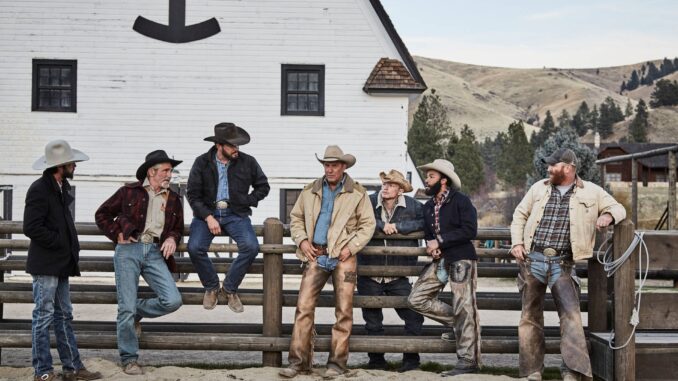
The Tectonic Plates of Yellowstone: When On-Screen Loyalty Collides with Off-Screen Drama
The vast, untamed landscapes of Yellowstone offered viewers a visceral escape into a world of rugged beauty, fierce loyalty, and the relentless struggle to preserve a legacy. For five seasons, the Dutton family, led by the indomitable John Dutton, epitomized the grit and moral ambiguity of the modern American West. Yet, as the sun began to set on the show’s original run, a different kind of drama unfolded, far from the scenic vistas and closer to the cutthroat realities of Hollywood. The behind-the-scenes turmoil surrounding Yellowstone and the contentious departure of its star, Kevin Costner, serve as a potent illustration of how creative vision, star power, and logistical realities can collide, threatening to unravel even the most beloved television phenomenon.
The initial allure of Yellowstone was undeniable. Taylor Sheridan’s masterful storytelling, imbued with a Shakespearean sense of tragedy and ambition, found its perfect conduit in Kevin Costner. Costner, an icon synonymous with the Western genre, brought an unparalleled gravitas and authenticity to John Dutton. He was the stoic patriarch, a man whose unwavering commitment to his ranch and family was the very bedrock of the series. This perceived stability, however, masked a growing seismic activity beneath the surface of the production.
Behind-the-scenes drama on a show of Yellowstone‘s scale is not uncommon, but the whispers surrounding this production seemed particularly intense. Reports of Sheridan’s demanding creative control, his prolific output across multiple projects, and a production schedule that often left little room for flexibility began to emerge. When you combine this with a superstar like Costner, who carries his own creative ambitions and a long-standing career outside of television, the stage was set for a potential clash. The friction wasn’t just about scheduling; it was a fundamental difference in how each party viewed their role and the show’s trajectory.
The eventual public unraveling centered largely on Kevin Costner’s availability and his commitment to his passion project, the multi-part Western film saga Horizon: An American Saga. As Yellowstone geared up for its fifth and final season, the cracks became chasms. Costner, whose contract stipulated a certain number of days per season, found himself caught between the demands of the show and his own directorial and acting commitments for Horizon. Reports indicated a struggle to secure his availability for sufficient shooting days for Yellowstone Season 5, Part B.
So, what did Kevin Costner say about leaving the series? His statements, primarily conveyed through court documents and later in interviews, painted a picture of frustration and a feeling of being unfairly maligned. During divorce proceedings, court filings revealed that Costner felt he was being “held hostage” by Yellowstone producers and that he was offered significantly less money to appear in fewer episodes for the back half of Season 5.
More specifically, Costner expressed that he had already rearranged his schedule once for the show, pushing back Horizon to accommodate Yellowstone. He explained that for the latter half of Season 5, he was offered reduced time and salary but the scripts were not ready, making it impossible for him to commit to specific dates. He testified that he “couldn’t help them anymore” when it came to scheduling, citing that he “gave up Horizon“ for Yellowstone and that the network “changed their story” about the production timeline. He wasn’t just citing logistical hurdles; he was expressing a deeper dissatisfaction, a sense that the production wasn’t reciprocating his commitment and that his character’s narrative wasn’t being treated with the respect he felt it deserved. In essence, he implied that the creative direction and scheduling demands from the Yellowstone team were making it impossible for him to fulfill his obligations while also pursuing other essential career goals. He wanted to continue, he stated, but felt the goalposts were constantly being moved, and the delays meant he couldn’t push Horizon back indefinitely.
The outcome was a narrative nightmare for the show. The beloved patriarch, John Dutton, whose life and struggles defined the series, would effectively be written out, or at least conclude his story in a hurried or ambiguous fashion. The grand saga of the Duttons, a testament to loyalty and land, found itself ironically fragmented by a very human conflict over time, money, and creative control.
The Yellowstone behind-the-scenes drama, culminating in Costner’s departure, is a stark illustration of the fragile ecosystem of hit television. It demonstrates how even the most compelling on-screen chemistry can be disrupted by off-screen realities; how the vision of a singular creator can clash with the demands of an established star; and how a show built on themes of unwavering commitment can ultimately fall victim to the very real constraints of scheduling and contractual obligations. The legacy of Yellowstone will undoubtedly endure, but its final chapters will forever be underscored by the reverberations of a powerful, illustrative drama that unfolded not on the vast, untamed plains, but in the often-turbulent boardrooms and production offices of Hollywood.
